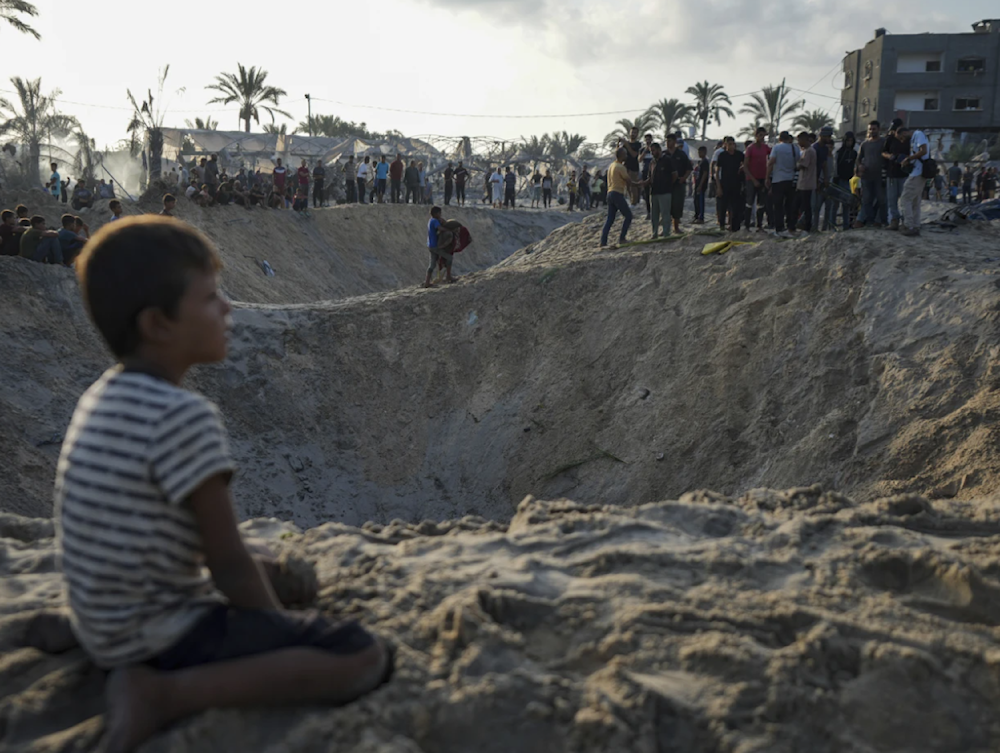Subjugation of Palestinians driving Middle East instability: NI
According to Paul R. Pillar, the political persecution of Palestinians, rather than the organizations labeled as "Israel's" opponents, is the fundamental engine of Middle Eastern instability and bloodshed.
-

Palestinians look at the destruction following an Israeli airstrike on a crowded tent camp housing Palestinians displaced by the war in al-Mawasi, Gaza, on September 10, 2024. (AP)
According to Paul R. Pillar, writing for the National Interest, the persistent instability in the Middle East is caused by more than simply local conflicts and derives from a deeper, underlying issue: "Israel's" treatment of Palestinians.
While the area region several complex and interconnected problems, the denial of Palestinian self-determination, along with "Israel's" occupation, blockades, and everyday suffering inflicted on Palestinians, remains the principal cause of violence and unrest.
Pillar, a former US intelligence analyst, writes that this ongoing subjection feeds the cycle of violence, making long-term peace impossible. Despite attempts by the United States and others to douse the flames, "Israel's" actions (similar to the US) put the region in constant instability.
He asserts that recent tragedies in Gaza, which have resulted in tens of thousands of dead and a terrible embargo, lie at the heart of the Middle East's overall instability. It is in fact the political persecution of Palestinians, rather than the organizations labeled as "Israel's" opponents, that is the fundamental engine of Middle Eastern instability and bloodshed.
He points to the" suffocating blockade" that the occupation has maintained over Gaza, which in turn made it the largest open-air prison.
Natural human imperative to strike back against bloodshed
Pillar argues that it is a natural human imperative to strike back against those responsible for imposing such conditions, referring to the multi-front reactions from Yemen and Lebanon.
In Yemen, the YAF has attacked Red Sea ships bound for "Israel" in support of Gaza, pushing the US to intervene. Similarly, Hezbollah in Lebanon initiated attacks against "Israel" in support of the Palestinians. Both Resistance movements have said unequivocally that their acts would halt once "Israel's" brutality against Gaza ceases, emphasizing how Palestinian subordination promotes regional strife.
He further notes that Hezbollah and Hamas developed as a direct response to Israeli policy, notably the colonization of Palestinian territories. Hezbollah's rise in the 1980s was partly owing to its position as a defender of Lebanon against "Israel's" 1982 invasion, which attempted to undermine the Palestine Liberation Organization (PLO), a direct result of Palestinian land being occupied.
Similarly, Hamas, formed in 1987, developed into prominence as a result of widespread dissatisfaction with the Palestinian Authority's incapacity to successfully resist Israeli occupation.
The 'real problem' of Iran
Iran is sometimes misidentified as the "real problem" in the Middle East, Pillar notes, adding that most of the regional conflict involving Iran with "Israel" also derives from the Palestinian dilemma. Iran's actions, including retaliatory assaults against "Israel," are primarily motivated by Israeli attacks on Iranian interests and the continuous persecution of Palestine.
Pillar believes Iran's actions have been "largely reactive," emphasizing how while its rhetoric seems severe, it is mostly a reaction to "Israel's" treatment of Palestinians, rather than an intellectual rejection of "Israel" itself. If the Palestinian issue is resolved, then Iran's reactions may differ.
In an alternate history in which Palestinians had established their own state, either in 1948 or after the 1967 conflict, the Middle East would most likely be less violent, albeit not without obstacles.
Pillar concludes that this parallel Middle East would be vastly different and considerably less violent than the actual Middle East of the last few decades. If "Israel" was no longer subjugating the Palestinians, it would not be necessary to use so much violence to keep them subservient.

 4 Min Read
4 Min Read








